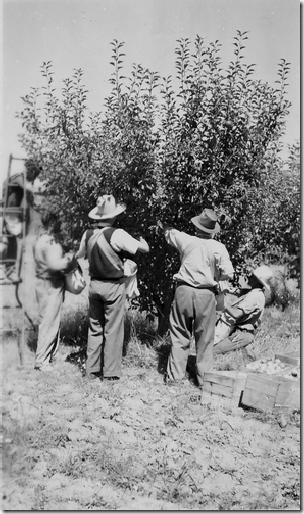Note to readers: This post appeared as a column in the Armidale Express on Wednesday 23 September 2009. I am repeating the columns here with a lag because the Express columns are not on line. You can see all the columns by clicking here.
This photo from cousin Jamie’s collection shows men picking fruit in the orchard at Glenroy, Kentucky. The year is 1948.
Working in this orchard was my first paid job. I was just about to start university. For a dollar an hour I thinned the fruit, removing small apples to allow the bigger ones to grow.
The job was a bit of a culture shock.
To begin with, I had to start work at 7.30am, a very early hour for someone like me used to going to bed late. At seven, I would leave the house carrying my lunch and a thermos full of tea and walk across the paddocks and up the hill to the orchard.
I was working with an old bloke, at least he seemed old to me, who was something of a Uralla identity. At smoko we would roll a cigarette and then drink our tea while he chatted. I took to drinking tea black with no sugar because that was the way he drank it.
I learned some weird and wonderful things over the weeks we worked together; stories of prospecting, of secret gold finds, of long past district scandals.
All of this came rushing back to me recently because of a story I was researching on carbon farming.
I had been noticing an increasing number of references to carbon farming, a farming process that captures CO2 in the soil, reducing green house gasses while increasing soil fertility. I had also noticed that some of the National Party parliamentarians were attacking plantation forestry, arguing that changed farming techniques were a far better way of capturing CO2 than locking large areas up in softwood plantations.
As I dug down I found a fascinating story of challenge and change, a story largely ignored by the city media. This is a world where individual visionaries are trying to change the way we manage the land, in so doing struggling against conventional wisdom and the way this has become enshrined in legislation and regulation.
The remarkable story of Peter Andrews and his campaign to re-hydrate the Australian soil was well covered in one of the most popular ABC Australian Story series.
The story of Dr Christine Jones, is less well covered. She is a retired CSIRO soil scientist who has spent the last two years campaigning around Australia trying to interest farmers in adopting carbon farming techniques. The claims made by Dr Jones are quite startling. I quote:
“This year Australia will emit just over 600 million tonnes of carbon. We can sequester 685 million tonnes of carbon by increasing soil carbon by half a per cent on only 2% of the farms. If we increased it on all of the farms, we could sequester the whole world's emissions of carbon.”
Reading the stories of the work of Andrews, Jones and their disciples was absolutely fascinating. I followed the on-line story over two years of the experiments of one WA wheat farmer in the application of Peter Andrew’s natural farming sequence approach. One outcome was reduced salinity.
The reason my research on carbon farming brought Glenroy and the New England past back to me lies in the role of farmer or grazier as experimenter, innovator.
There is, I think, a growing modern urban view that sees the farmer in some way as a landscape destroyer, guilty of raping the continent. This view leads naturally into a focus on control, on limiting the things that farmers can do with their land.
Of course there have been farming mistakes. There has also been a continuing tension between the constant need to improve productivity and the need to maintain the land for the long term.
In all this, it is easy to forget that, at least so far as the New England is concerned, it is the farmers and graziers themselves that have been at the heart of land management and improvement.
There is a good story here that needs to be told. But this will have to wait to another column!












No comments:
Post a Comment